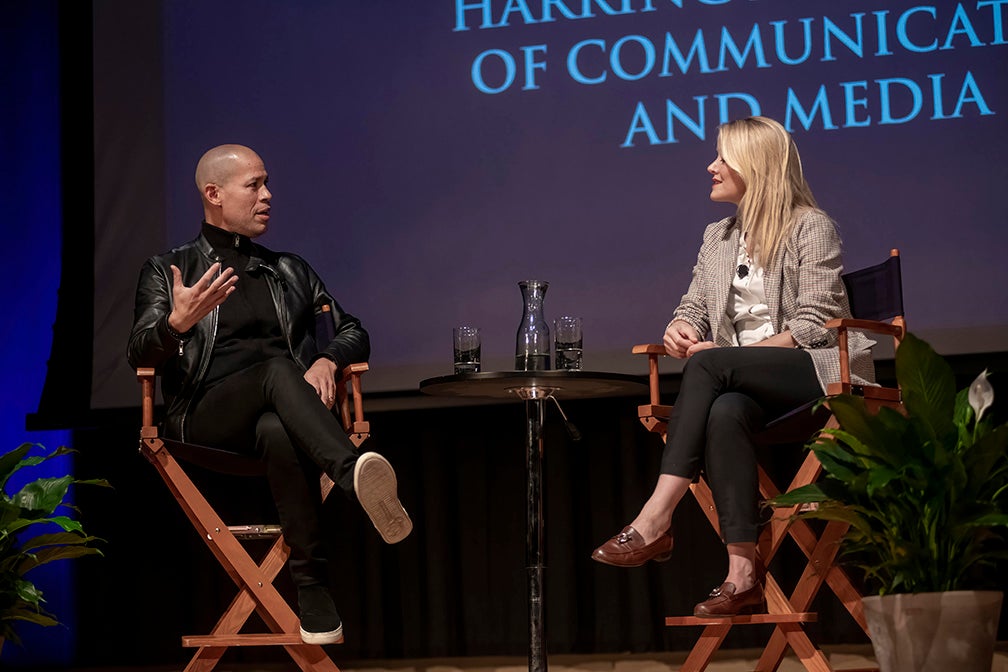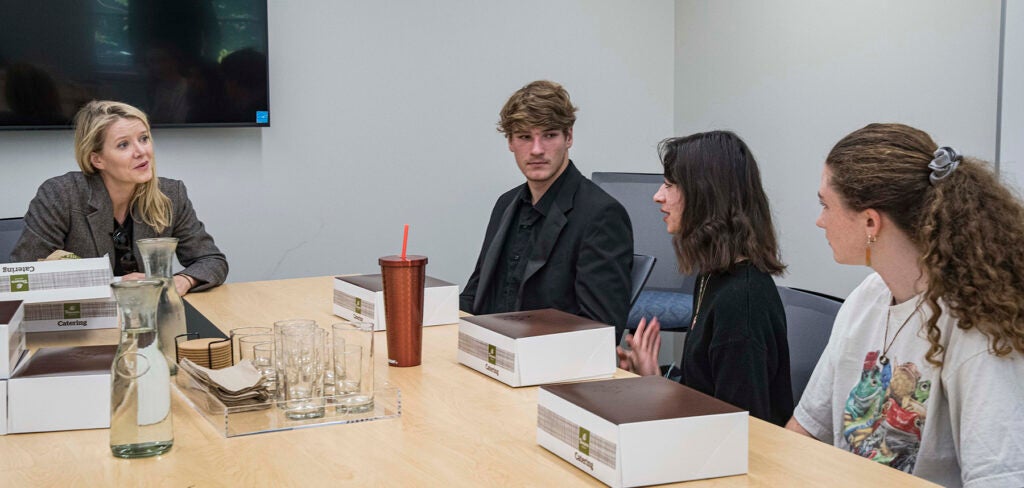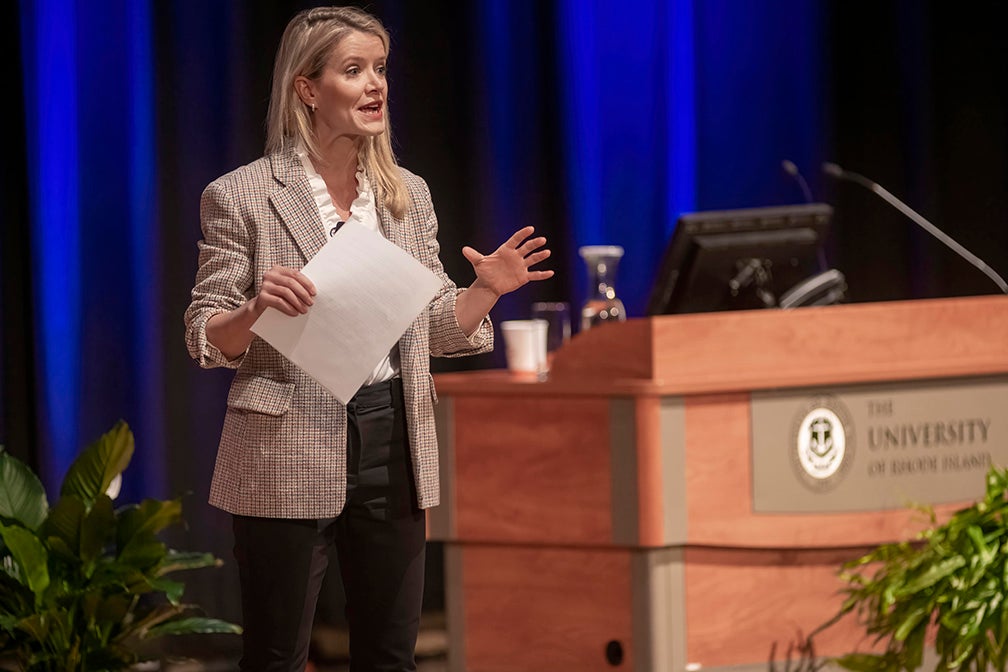KINGSTON, R.I. – Oct. 24, 2022 – PBS NewsHour correspondent Jane Ferguson, a veteran of war reporting from such conflict hot spots as Yemen, Iraq, Afghanistan, and Ukraine, says she’s a crier. Sad movies and holiday ads showing a dog abandoned in the snow can get her going.
“I’m a human being. I throw my arms around people. I express shock,” Ferguson said Thursday in Edwards Hall on the University of Rhode Island’s Kingston Campus. “But I try not to let my emotions become the center of the camera’s attention.”

Delivering the 15th annual Christiane Amanpour Lecture, hosted by URI’s Harrington School of Communication and Media, Ferguson shared with an audience of about 200 people—especially with the numerous journalism students in attendance—the techniques she uses to capture the human side of global conflict in her reporting.
The tip about crying on camera was one of the things not to do—along with moralizing—but she said it’s open to debate, especially in today’s world and given the advice she offered during the evening about bringing a human focus to war reporting.

“The reality is that as reporters we’re the conduits to tell these stories to help the audience understand and communicate with our subjects, these people who have been brave enough to share their feelings and their experiences with us,” she said. “It’s not about us. If we draw the [viewer’s] attention to our own emotions, we rob their attention from the people whose stories we’re here to tell.”
Growing up in rural Northern Ireland, Ferguson said she had a wanderlust and dreamed of being a foreign correspondent from a young age. She was fascinated by women correspondents on the BBC, traveling the world, interviewing important people, and catching the attention of the men in her house who would hush those around them so they could listen to the women reporters. Something she hadn’t seen them do “in real life.”
“I also grew up during a [sectarian] conflict in Northern Ireland … and I was fascinated,” she said. “I grew up down the road from a bunch of farmers who brought the British government to its knees with some bags of fertilizer and smuggled shotguns. In retrospect, I couldn’t understand what would make a normal person—bakers, farmers, taxi drivers—commit acts of violence. And what made communities hate one another.”
When she was 25, she acted on her wanderlust and hopped a plane to Afghanistan to cover the conflict—or, as she referred to it Thursday, the “bang bang”—with no formal training as a journalist. She was a very green, cub reporter with a fantasized view of what covering a conflict meant, she said.
Luckily for her, she was assigned by her newspaper to do a profile of British-Australian war photographer Tim Page, famous for his work during the Vietnam War. “I thought of him as one of the toughest and certainly one of the most brave and grizzled reporters out there,” she said. “The afternoon I spent with Tim Page was extremely eye-opening. What I found out not only surprised, but it massively informed me and shaped me as a reporter.”
What she learned was the importance of showing through her reporting the impact of conflict, war and oppression on the everyday people living through it, and the importance of presenting them as well-rounded “characters” and intertwining the news through their experiences.
To emphasize her points during her talk, Ferguson shared several PBS NewsHour videos of her reporting in Kabul, Afghanistan, in the wake Taliban rule, while also reading from her upcoming memoir and a 1995 New York Times story by Roger Cohen on the toll of war in Sarajevo.
The “first and foremost backbone” of covering war with a humanist perspective, she said, is telling stories through the eyes of those living through it. “I can’t emphasize enough that that’s really where you start,” she said, “when you’re trying to communicate to your audience, your viewers and your readers, how war is actually impacting human beings.”
In finding those “characters,” she stressed that she’s not looking simply for a “sound bite.” Bringing that home, Ferguson showed a clip of her report on Dr. Najmussana Shefajo, a leading gynecologist in Kabul, who Ferguson interviewed numerous times. After the Taliban came to power, Shefajo considered giving up her hospital and leaving the country for the sake of her daughters’ future.
“To build a character rather than an interview takes time,” Ferguson added. “You have to approach someone like her with sensitivity and an absolute openness to listen.”
While the use of “characters” makes the reports more relatable to viewers, it also helps them absorb the news and allows reporters to more fully report on complex issues—such as the oppression of women, or the plight of refugees—that are part of the conflict.
They also provide “rich insight” into what people trapped in the conflict are living through—their fears, strengths, sacrifices, she said, after showing an interview with Shaharzad Akbar, the head of human rights in Afghanistan, who lived through the assassination of numerous friends and colleagues by the Taliban.
During a question-and-answer session, Ferguson—who has won Polk, Emmy, Peabody, and duPont awards, among others—was joined by URI alumnus Vladimir Duthiers ’91, a CBS News correspondent and anchor, who asked her how she holds on to her humanity and handles the pressure of moving from one conflict to another.
“You have to take care of yourself,” she answered. “Added into the subliminal trauma that we’re all experiencing while working is the fact that we’re also physically and emotionally exhausted. … So, there’s this little valve of emotion that I think we have to release, whether it’s in the car or it’s in your hotel room in the evenings. I must admit I’m guilty of trying to hold it together a lot until I’m home. And then I have what I call the big cry.
“In terms of keeping your humanity,” she added, “the reality is I don’t understand how anybody could become numb to these things. I wouldn’t do this job if I didn’t really care. I’m a public broadcaster. I’m not making millions of dollars. I’m working incredibly long hours. You don’t do this for glamour. You only can sustain it at this level if you actually care.”
To view Ferguson’s presentation in full, please go to the lecture webpage.
The Christiane Amanpour Lecture Series was endowed in 2008 by Amanpour ’83, Hon. 95, the longtime CNN chief international anchor and global correspondent, and brings national and international journalists to the URI campus each fall. To donate to the Amanpour Lecture fund, click here.

